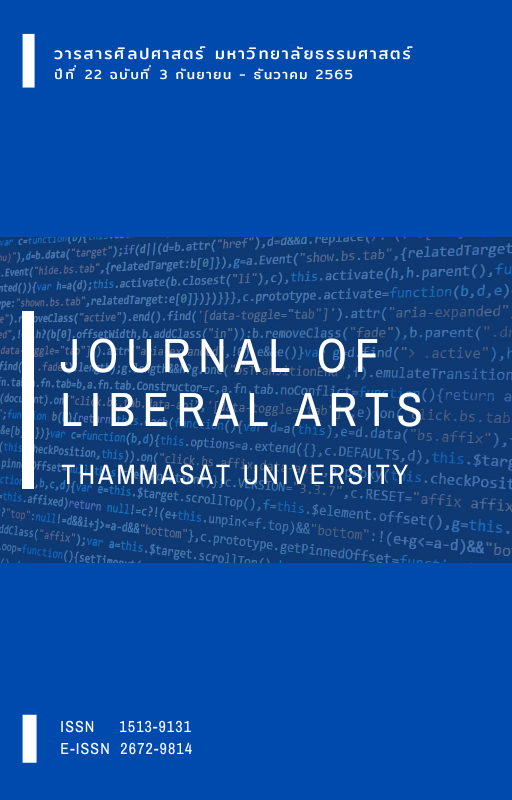ผลพลอยได้ของนโยบายเศรษฐกิจใหม่ (ค.ศ. 1971-1990): อำนาจนำของอัมโนและอำนาจถดถอยของชุมชนคนเชื้อสายจีนในการเมืองมาเลเซีย
Main Article Content
บทคัดย่อ
บทความวิจัยนี้ต้องการศึกษาการเมืองเรื่องเชื้อชาติในมาเลเซียในช่วง การบังคับใช้นโยบายเศรษฐกิจใหม่ (ค.ศ. 1971-1990) โดยมีข้อเสนอว่า นโยบายนี้ก่อให้เกิดผลพลอยได้ 2 เรื่องที่สัมพันธ์กัน คือ หนึ่ง อำนาจนำทางการเมืองของพรรคอัมโนของชาวมลายู สอง อำนาจถดถอยของชุมชนคนเชื้อสายจีนในการเมืองมาเลเซีย ปัจจัยที่ทำให้อัมโนคุมอำนาจการเมืองได้เพราะ หนึ่ง นโยบายเศรษฐกิจใหม่ได้สร้างชนชั้นกลางชาวมลายูกลุ่มใหม่ที่มั่งคั่ง ดังนั้น การสนับสนุนทางการเงินจากชุมชนนักธุรกิจจีนจึงไม่สำคัญเหมือนก่อนหน้านั้นอีกแล้ว สอง การควบคุมสถาบันสำคัญของรัฐ ได้แก่ ระบบราชการ กองทัพแห่งชาติ ฝ่ายตุลาการ และสถาบันกษัตริย์ สาม การควบคุมระบบการเลือกตั้งที่เป็นประโยชน์สูงยิ่งต่ออัมโนในการเลือกตั้งทั่วไป ทั้งหมดนี้ส่งผลให้อำนาจการเมืองของชุมชนจีนลดลงมากทั้งในด้านการมีส่วนร่วมทางการเมืองและอำนาจต่อรอง
Downloads
Article Details

อนุญาตภายใต้เงื่อนไข Creative Commons Attribution-NonCommercial-NoDerivatives 4.0 International License.
เอกสารอ้างอิง
จุฬาพร เอื้อรักสกุล. (2565). เส้นทางวิบากยาวนาน: การเปลี่ยนแปลงจาก “ชาวจีนโพ้นทะเล” เป็น “พลเมืองเชื้อสายจีน” ในรัฐเอเชียตะวันออกเฉียงใต้. คณะศิลปศาสตร์ มหาวิทยาลัย ธรรมศาสตร์.
ภูวดล ทรงประเสริฐ. (2547). จีนโพ้นทะเลสมัยใหม่. Higher Press.
ศุภการ สิริไพศาล, และ อดิศร ศักดิ์สูง. (2552). การดำเนินนโยบายสังคมพหุวัฒนธรรมในรัฐเคดาห์และปีนังของมาเลเซีย ค.ศ.1970-2008. สำนักงานคณะกรรมการส่งเสริมวิทยาศาสตร์ วิจัยและนวัตกรรม.
อภิชา ชุติพงศ์พิสิฏฐ์. (2561). ชาตินิยมชาวจีนมลายา: การเคลื่อนไหวในดินแดนอพยพและความผูกพันกับมาตุภูมิกลางคริสต์ศตวรรษที่ 19 ถึงสมัยการได้รับเอกราชของสหพันธรัฐ มลายา ค.ศ.1957. วารสารประวัติศาสตร์, 43 (สิงหาคม 2561-กรกฎาคม 2562), 18-30. https://core.ac.uk/download/pdf/228509758.pdf
Andaya, B. W., & Andaya, L. Y. (2001). A History of Malaysia. Palgrave.
Cartier, C. (2003). Diaspora and Social Restructuring in Postcolonial Malaysia. In L. J. C. Ma & C. Cartier (Eds.), The Chinese Diaspora: Space, Place, Mobility, and Identity (pp. 69-96). Littlefield Publishers, Inc.
Crouch, H. A. (1996). Government and Society in Malaysia. Cornell University Press.
Freedman, A. L. (2000). Political Participation and Ethnic Minorities: Chinese Overseas in Malaysia, Indonesia, and the United States. Routledge.
Gomez, E. T. (1994). Corporate Involvement of Malaysian Political Parties. Centre for Southeast Asian Studies.
Gomez, E. T. (2021). New Economic Policy@50: Looking back and forward, 26 July 2021. http://www.ehm/my/publications/articles/new-economic-policy-50-looking-back-and-forward
Heng, Pek Koon. (1988). Chinese Politics in Malaya: A History of MCA. Oxford University Press.
Jomo, K. S. (2004). The New Economic Policy and Interethnic Relations in Malaysia. Identities, Conflict and Cohesion Programme. Paper Number 7, September. United Nations Research Institute for Social Development.
Jomo, K. S. (2005). Malaysia’s New Economic Policy and ‘National Unity’. In Y. Bangura & R. Stavenhagen (Eds.), Racism and Public Policy (pp. 182-214). Palgrave Macmillan.
Lee, Kam Hing. (1997). Malaysian Chinese: Seeking Identity in Wawasan 2020. In L. Suryadinatra (Ed.), Ethnic Chinese as Southeast Asians (pp. 72-114). Institute of Southeast Asian Studies.
Means, G. P. (1991). Malaysian Politics: The Second Generation. Oxford University Press.
Skinner, G. W. (1996). Creolized Chinese Societies in Southeast Asia, In A. Reid (Ed.), Sojourners and Settlers (pp. 51-93). Allen & Unwin.
Suryadinatra, L. (2007). Understanding the Ethnic Chinese in Southeast Asia. Institute of Southeast Asian Studies.
Suryadinatra, L. (2015). The Making of Southeast Asian Nations: States, ethnicity, indigenism and citizenship. World Scientific Publishing.
Suryadinatra, L. (2017). The Rise of China and the Chinese Overseas. Institute of Southeast Asian Studies.
Tan, Chee-Beng. (2012). Malaysia: Ethnicity, Nationalism, and Nation-Building. In L. H. Guan & L. Suryadinatra (Eds.), Malaysian Chinese Recent Developments and Prospects (pp. 1-25). Institute of Southeast Asian Studies.
Wang, Gungwu. (2003). Reflection on Malaysian Elites. In G. Wang (Ed.), Only Connect: Sino-Malay Encounters (pp. 87-110). Eastern University Press.
Wong, Chin Huat. (2012), The End of Chinese Malaysians’ Political Division? The March 8 Political Tsunami and Chinese Politics in Penang, Selangor, and Perak. In L. H. Guan & L. Suryadinatra (Eds.), Malaysian Chinese Recent Developments and Prospects (pp. 86-108). Institute of Southeast Asian Studies.


